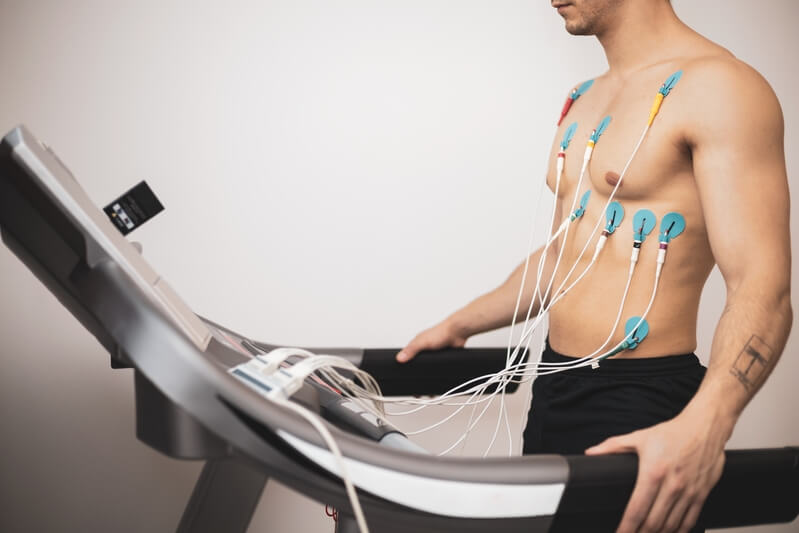
An exercise stress test, also called a cardiac stress test, is used to learn more about your heart when you are in motion. Questions answered during a stress test include:
An exercise stress test is an excellent tool for learning how to identify and evaluate a variety of heart issues, such as:
Cardiac exercise stress tests are a great way to determine if you need additional tests to confirm a diagnosis. They can also help determine if you need treatment to lower your heart attack and heart disease risk.
The purpose of a stress test is to make your heart pump harder and faster, like when you are exercising. To get your heart pumping faster and harder, you typically walk or run on a treadmill or ride a stationary bicycle. That is why the process is referred to as an exercise stress test.
During a stress test, various metrics are measured to see how your heart responds when it has to work harder. Stress test records readings for:
Exercise stress tests can be used to detect several heart problems, such as:
If you don’t have any risk factors or have minimal risk factors for coronary artery disease or heart disease, you probably don’t need a cardiac stress test.
The exercise stress test is for people who are experiencing signs of heart disease, such as:
If you already have a heart disease diagnosis, an exercise stress test is appropriate if:
A range of exercise stress tests can monitor your heart’s function. Exercise stress tests check your oxygen levels, blood pressure, heart rate, and electrical activity.
An exercise stress echocardiogram assesses your heart’s function when beating fast. It is commonly called a stress echo or echo stress test.
An exercise stress echocardiogram is often used if the results of your exercise stress electrocardiogram don’t provide enough information.
An echo stress test takes an echocardiogram of your heat before you start exercising and then again when you are at your peak exercise intensity. The two images will show how blood flows through your heart and valves when at rest and during exercise.
A nuclear stress test is an advanced heart stress test. During this test, safe levels of a radioactive substance, called a tracer, are injected into your veins. The tracer is absorbed into your bloodstream and heart muscle.
Next, a cardiac imaging scan is taken to assess your heart function. The areas where the tracer is absorbed will look different than areas where it isn’t absorbed. This helps to identify areas of your heart that don’t have good blood flow. These areas are called “cold spots” or “defects.”
With a nuclear stress test, a special camera takes pictures of your heart at rest and immediately after exercise. These two different imaging scans will allow your cardiologist to compare how blood flows through your heart muscles when resting and active.
If you cannot perform physical exercise, medication may be used to dilate your blood vessels and increase your heart rate. This process is used to simulate the conditions of exercise.
A nuclear cardiac stress test can provide you with more detailed information about your heart’s functions, including:
A cardiac rehabilitation stress test is used when you are undergoing a supervised rehabilitation program to become more physically active.
There are two primary types of cardiac rehabilitation stress tests:
An exercise stress test isn’t for everyone. If you have a heart condition that makes it unsafe to stress out your heart, you shouldn’t take an exercise stress test. If you have any of the following conditions or symptoms, please discuss the safety of performing a stress test with your cardiologist:
Dr. Ahiable will work with you to determine if you need an exercise stress test and which specific tests you need. An exercise stress test can be essential to understand what is happening with your heart when you exercise.
For appointments, call 727-300-2282 or request an appointment online and learn how to protect your cardiac health.